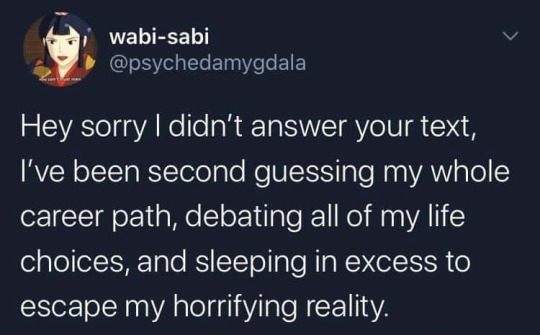Text
Okay can I just say that I hate hate HATE pre-lecture videos with a BURNING PASSION. I have such a hard time following them and it's unbelievably frustrating to have to pause every few seconds to let my hand catch up in writing notes, or rewind a little to rewatch a part because I missed a detail or had a hard time understanding the explanation. I get so anxious whenever the prof assigns new videos to watch because I absolutely dread the frustration watching these videos makes me feel. A 5 minute video ends up taking me 10 minutes instead to watch. Please, you're already giving us pre-lec readings that cover the same thing, why can't you just give us more readings? Urgh I want to SCREAM.
0 notes
Text
I am ambitious, just not in the way you want me to be.
0 notes
Text
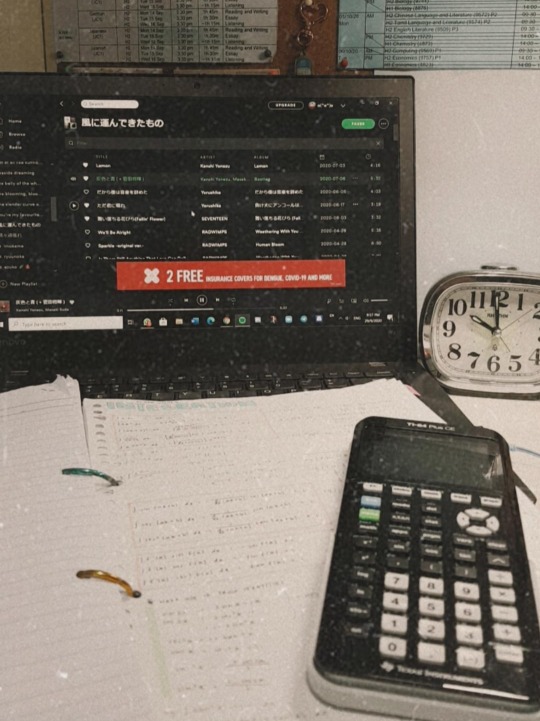
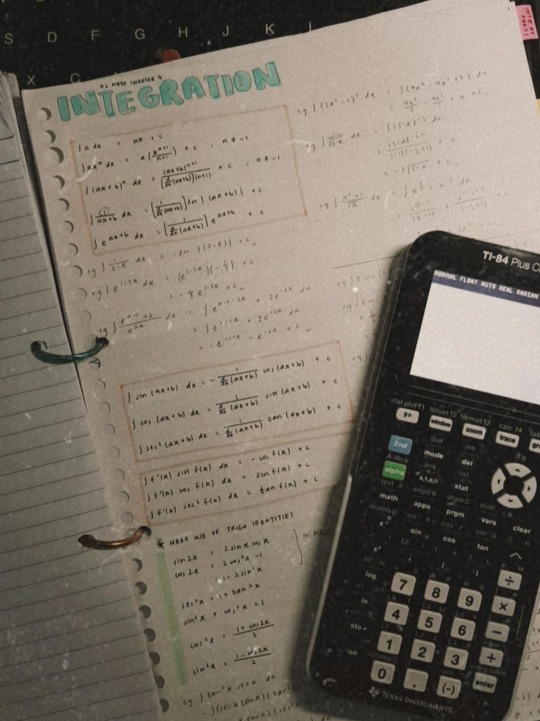
29.09.20
i'm desperately cramming for my math exam in two days :( i've been struggling a lot with math this year; no matter how many practices i do i can't seem to improve :") i'm currently working on going through my past worksheets and looking through my old mistakes!!
i really, really wanna pass :(( my math teacher this year is super nice and helpful; i don't wanna let her down ahhh
♪ 今日のおすすめ: XO - EDEN
164 notes
·
View notes
Text
This school year, one of my goals is to not forget about my hobbies. In the past, I've been burned really badly after spending entire semesters just focusing on schoolwork, not letting myself have fun because I would feel guilty for wasting any time I could be spending on studying. But then at the end of every semester and year, like clockwork, I would crash and burn terribly from the intense regret I felt for abandoning my hobbies for such a long time. And not just that, but since I'd been away for so long, it was almost impossible to work up the courage to delve back into those hobbies due to my insecurity over my rusty skills, which were of course caused by my long absence.
So, rather than keep doing the same thing over and over again, and suffering the same consequences each time, this year I've decided to put more priority on my hobbies. As much as possible, I'll try to sneak them in my days.
3 notes
·
View notes
Text
It’s that time of year again....
September has reared its ugly head--the Monday of the year has returned once more. And once again, I find myself having a mini-crisis about school, my future, life, and everything in between. I’ve been feeling everything from anxiety, worry, despair, and grief--is this all from the stress of school starting up again? The anticipation of being plunged into classes, schoolwork, studying, readings, and more, deadline after deadline, assignment after assignment.....with no time left for my hobbies is despair-inducing to say the least. Oh well, I can always try to make some time at least.
0 notes
Text
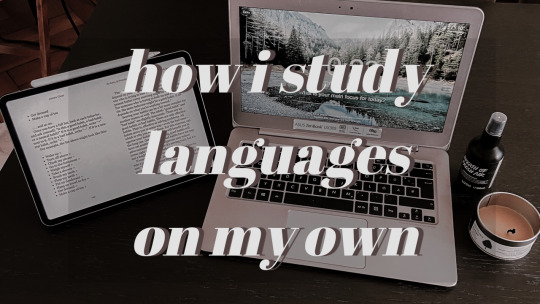
click here for my new video! i’m sharing some language learning study tips that i use to self-study languages at home, featuring apps, websites, podcasts and books that i really enjoy using!! hopefully this will be helpful and inspire some of you :) if you enjoy my videos, please leave a like/sub, that would be so appreciated!!
11K notes
·
View notes
Text
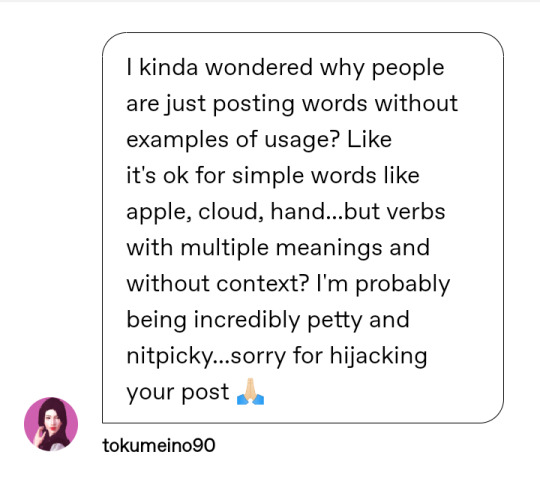
@tokumeino90
Oh it's no problem at all, input is always welcome! That's a very good point, and something that bothers me as well. Nouns tend to just be straightforward, but verbs can have a lot of nuance, depending on the context. But even if they list out all the different possible meanings of a verb, you won't know when to use which meaning without example sentences. A lot of the time a simple vocab list with definitions just doesn't suffice, and that's a huge pitfall of relying on langblrs. And even if you only care about the definitions, there's no guarantee that they're accurate either.
Langblr blogs seem like a nice and fun way to learn a language, but then again most of these bloggers are learners themselves and they're bound to have misunderstandings of the language, especially when compared to a native speaker. So it's better to view langblrs as a record of progress, rather than as a learning resource. I have to remind myself to always double check vocab lists, grammar points and the like. Of course, this applies to my blog as well!
9 notes
·
View notes
Text
Langblr blogs seem like a nice and fun way to learn a language, but then again most of these bloggers are learners themselves and they're bound to have misunderstandings of the language, especially when compared to a native speaker. So it's better to view langblrs as a record of progress, rather than as a learning resource. I have to remind myself to always double check vocab lists, grammar points and the like. Of course, this applies to my blog as well!
9 notes
·
View notes
Note
Do you have any advice for Japanese learners who struggle to overcome the intermediate plateau? You are so knowledgeable about Japanese, I'd love to hear your experiences on how you learn and keep improving! Thank you ^_^
Aww man you’re just too sweet. I’m still in the process of learning too. 💗
That intermediate plateau is the hardest thing to overcome. It’s something that was talked a lot about in some of the second language acquisition courses I took back in uni. Let’s delve further into it, because this is something that all language learners will struggle with, regardless of what language you’re learning.
What is the Intermediate Plateau?

👆 a visual representation of the plateau lol
When you first start learning a new language, most learners experience quick and satisfying progress. “Oh man, learning the “te” form was way easier than I thought it’d be!” or “Okay, I got this list of verbs down right away!” “Alright, I got this hiragana down!”
But then you move on to the kanji. The whole kudasaru, yaru, kureru, ageru, sashiageru, morau, itadaku mess, and you start to struggle a bit. But you can still do it! You’re still learning the words and the grammar and it’s challenging, but you can feel your progress and success.
But then you finish your textbooks (Probably Genki I, Genki II, and An Integrated Approach to Intermediate Japanese), and suddenly those bursts of success become less and less, until you can no longer feel any progress.
You read manga and you see lots of words you know, but lots more words that you don’t know. You watch anime and you can catch some sentences, but there are still a lot that you wouldn’t have understood without the English subtitles to help you out.
This feeling of a lack of progress, of a stagnation, is called the “intermediate plateau.”
My Experiences with the Intermediate Plateau
I tackled the Intermediate Plateau twice: with spoken Japanese and written Japanese.
I’ve been lucky to have very good listening comprehension and an ability to “fill in the gaps.” After finishing Genki I, II, and An Integrated Approach to Intermediate Japanese, I could basically follow most spoken conversations. There were words I didn’t know, but through context I was able to make educated guesses at what they meant. However, I was stuck using simpler words when I spoke, and it was so frustrating to be able to understand the words, yet be unable to recall them and use them when I wanted to.
Then I graduated and moved to Japan. Oh man, I thought I was such hot stuff. “I studied Japanese for 5 years, and I even studied Classical Japanese. I’m gonna have such an easy time of it here.”
…It took me about three days of living in Japan to realize that I was absolutely illiterate. I couldn’t understand any of the visa application forms or what they were telling me I needed to provide. Misunderstood the times I had to have the garbage put outside because I had never seen the kanji 迄(まで, “until, by”) before. Couldn’t read most billboards.
Especially with that kanji for “made” 迄. That was what really made me realize that I was at the plateau kanji-wise. You learn the particle まで in your first year. It was something I could use perfectly. But I hadn’t even known that there was a kanji for it until I tried to take out my trash out and found out that I was supposed to have it in the bin BY 9:30, not AFTER 9:30, like I had guessed it meant. :(
To pour salt into the wound, I have been able to read in English since I was 3 years old. I literally cannot remember a time I could not read. It is one of my favorite pastimes and I also do creative writing. This made the fact that I couldn’t read all-the-more frustrating.
How I Overcame the Plateau
I took that frustration and I turned it into fuel. I vowed to learn ALL THE KANJI. I started using the website and app WaniKani obsessively. I’m here to tell you, that app is what made me literate. It is worth every single penny if you already have a good grasp on the language but your kanji is weak, like me.

Basically, it teaches you 2,000 kanji and 6,000 reinforcing vocabulary across 60 levels. It doesn’t group the kanji necessarily by JLPT level. Rather, it groups them by radicals and frequency more or less. Each level will introduce 3-4 radicals, and then 10-15 kanji that use those radicals. It quizzes you on their on-yomi and kun-yomi, gives you mnemonics to remember them, and then once you’ve answered them all correctly enough times, it introduces vocabulary that uses those kanji, further reinforcing the readings and increasing your vocabulary. As a former language teacher and studier of second language acquisition, I am here to tell you that this method works. And it’s fun. It doesn’t feel like studying.
I also started reading Rurouni Kenshin. Even today, it is a challenging read for me. Back then, it would take me days to read just one chapter. But I wrote down every new word in a notebook, and also saved them to my dictionary app, Akebi.
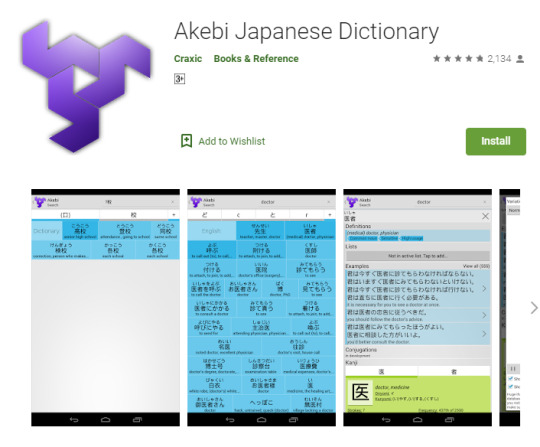
To this day, this dictionary is my lifeline. You can make vocabulary lists in there, so I have a list for each book or series I’m reading, along with a list of words I find just everyday in conversation or news or something. It’s got a simple flashcard quiz feature for each list too! Seriously, if you’re an Android user, I highly recommend this app. It’s free!
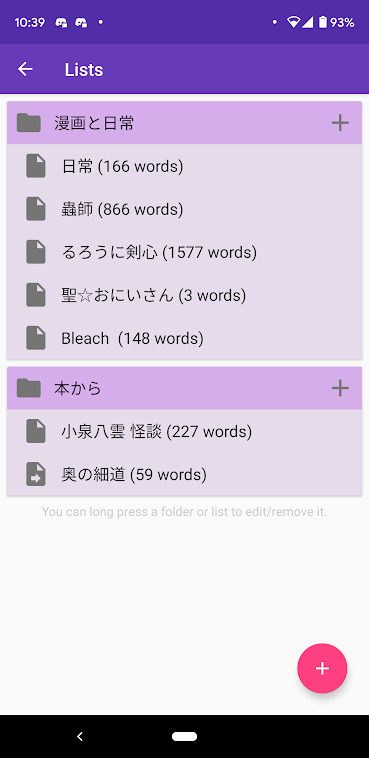
Those were my two main study methods. The more kanji I learned how to read, obviously I was able to read better.
The really fascinating thing about kanji is that they’re like Legos. You can stick them together to make any word you want, really. So if you understand each kanji and remember its pronunciation, even if you see/hear a word for the first time, you can put together the meaning piece by piece.
Because I understood more kanji and could recall their readings, I could hear a new word in a conversation and think to myself, “Okay, we’re talking about how Hokkaido doesn’t get as much snow as it used to. This word ‘ondanka’ must be…温 (おん, heat) 暖 (だん, heat) 化 (か, change). Oh! ‘global warming!’”
So when I overcame the kanji plateau, I simultaneously overcame the spoken plateau. Knowing the kanji gave me the power to hear a new word in a certain context and infer what kanji must be used for that word, and therefore what that word meant.
My Advice to You
For me, the key to overcoming the plateau in Japanese was studying more kanji. So I recommend that you keep studying kanji and keep reading. But make sure that they are reading materials that you love!! If you’re not interested in what you’re reading, you’ll run out of steam.
Another really important thing is to be cognizant of the progress you’ve made. For example, maybe you have a Japanese song you’ve been listening to for years, and for the first time today you picked out a new word–one that you just studied the other day. Pat yourself on the back at every victory, no matter how small it may seem! There’s proof of your progress.
Best of luck to you in your studies!
2K notes
·
View notes
Text
japanese emojis — meaning
emoji – meaning – origin
🈁️ here – ココ
🈂️ service – サービス
🈷️ month/moon – 月 (げつ / がつ / つき)
🈚️ free of charge / there isn’t – 無料 (むりょう) / 無し (なし)
🈶️ not free of charge / there is – 有料 (ゆうりょう) / 有り (あり)
🈯️ reserved – 指定 (してい)
🉐️ bargain – 得 (とく)
🈹️ discount – 割引 (わりびき)
🈲️ prohibited – 禁止 (きんし)
🉑️ acceptable – 可 (か)
🈸️ application – 申請 (しんせい)
🈴️ passing grade – 合格 (ごうかく)
🈳️ vacancy – 空室 (くうしつ)
🈵️ no vacancy – 満室 (まんしつ)
㊗️ congratulations – お祝い (おいわい)
㊙️ secret – 秘密 (ひみつ)
🈺️ open for business – 営業 (えいぎょう)
💮 well done/good job – 大変よくできました (たいへんよくできました)
3K notes
·
View notes
Text
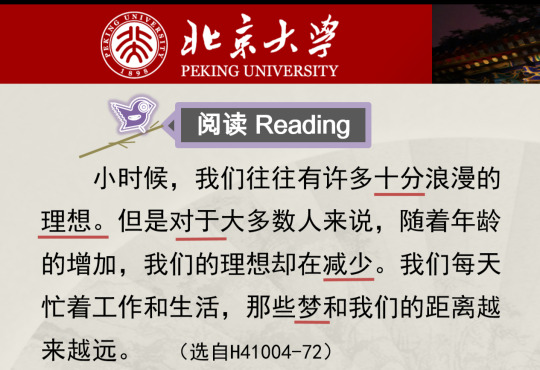
A very hallowed and deep reading in today's lesson that made me think about the dreams we have now, as youths.
As best as you can, try and follow those dreams to the end if that's what you want, although dreams change as people do.
[Translation: When we are young, we often have completely romantic ideals. But, for most people, as we get older, our ideals retreat. We become busy with work and life, and those ideals get further and further away. ]
42 notes
·
View notes
Photo








Reblog this if you are a langblr learning Japanese!
270 notes
·
View notes
Note
Do you think you can make a post about Japanese particles/letters(?) such as 々? I usually can’t find resources that talk about them for some reason
You probably can’t find them because many are out of common use, but of course I’ll make a post! This post will cover 々/〻 | ヶ/ヵ | ゑ/ヱ | ゐ/ヰ | ゝ/ヽ | 〆/乄. A surprising amount of this is coming from my own knowledge, but most everything else came from this wikipedia link. If I didn’t answer your question, please feel free to send another ask clarifying what you want specified ^_^
々/〻 - repeater kanji - usage: frequent
Sometimes this first character is called noma because it looks like ノマ squished together. It’s only used to show a repeated kanji, and it cannot stand alone. ex: 人々 is technically 人人 but written in proper japanese. Words with 々 are set phrases, so do not try to create your own words with it for “”emphasis.“” Click this jisho.org link to see examples.
The second character is only used in vertically handwritten texts. You’re most likely to see it calligraphically painted on historic artworks to be honest. You shouldn’t have to worry about this.
ヶ/ヵ - month/languages counter - usage: frequent
Despite appearances, both characters are read as ka. You’ll most frequently see this used when counting months. ex: 夏休みは約3ヶ月です。(Summer break is about 3 months long.) ヶ月 is the most common usage of this grammar point.
ゑ/ヱ - WE pronounced as E - usage: rare to obsolete
These characters take up one of the empty slots on your kana charts. Personally, I have only seen the first one. It’s used specifically in the name ゑびす, and gaming channels like to use it as an exclamation of sorts?? In the same way that え? is used in daily speech to represent confusion, gamers and maybe others might use ゑ. To me, this feels extra confused, but I’m not native so don’t take my word for it. According to google, this character is still relatively common in Okinawan loan words to make the ‘WE’ sound
The second character is the katakana version, and though I’ve never seen it, it has been used in ヱビス beer and an Evangelion title. According to wikipedia, this character is still used in Ainu.
Both of these can be rendaku’d to ‘VE’ but the rendaku’d characters are indeed nearly obsolete.
ゐ/ヰ - WI pronounced as I - rare to obsolete
Like the last bullet point, these fill an empty spot in kana charts. These characters can be rendaku’d to make a ‘VI’ sound. According to google, ゐ is relatively common in Okinawan loan words and ヰ is present in Ainu. The only times you may ever see these characters is in whisky brand names and the occasional cinematic production title. I’ve never encountered these characters in the wild, so I don’t have more to add.
ゝ and ヽ - kana reiteration marks - usage: certain common uses, but otherwise obsolete
These are for hiragana and katakana, respectively. They can get rendaku’d to show the continued dakuten pattern. In modern japanese, this is only used in certain names such as さゝき (Sasaki), おゝの (Ōno), and いすゞ (Isuzu). Notice how the last character has a rendaku in the Isuzu example. This rendaku shows how su changes to zu. You will almost guarenteed never see anything outside these examples.
〆/乄 - shime - usage: rare
〆 is really only used to mean deadline (〆切 instead of 締切), and it’s sometimes considered ryakuji (I have another post here on that). 乄 is used to mean an enclosed letter. I’ve seen both before, but I’ve seen the latter more frequently. I’m convinced the latter is more common, but again, please don’t quote me on that.
-
If people are interested, I’ll gladly make a part two to this post. There are definitely more unique japanese characters, but most of them really are obsolete, or at the very least highly specific. Just let me know. I hope I answered your question thoroughly anon!
184 notes
·
View notes
Photo






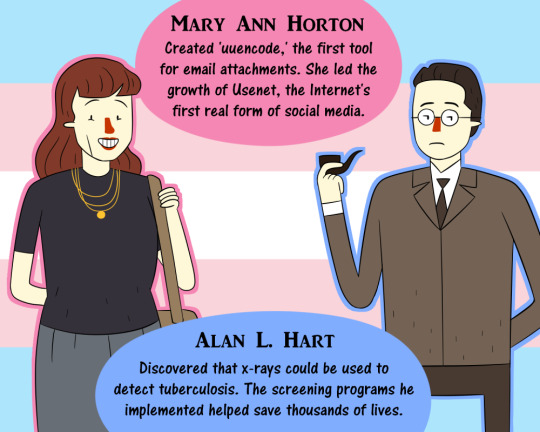


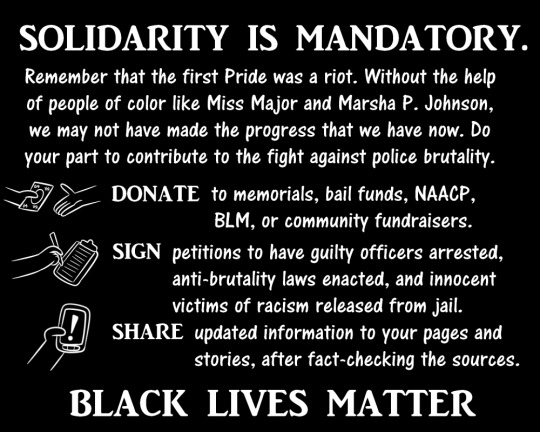
The world looks bleak, but progress is happening. We can’t stop now. (The last flag in the post is the queer flag, since I was getting asked about it)
4K notes
·
View notes
Text
AKSHDJDLDSLKL omg. I would liken it to knowing phonetic spelling, but not learning how words are actually spelled. Like you can read/write "bɛər" but do you mean "bear" or "bare"? Kind of like how if you can only read/write hiragana, you wouldn't be able to easily distinguish homophones that are clearly distinguished when you use Kanji.
A lot of people start off wanting to learn Japanese but then get scared away by Kanji, like it's some big scary boogeyman. Actually I've seen a similar attitude towards Chinese, where people make it seem like it's impossible to learn because of all the characters.
Maybe I'm biased coming from a Chinese language background, but Kanji is not that difficult to learn (if done properly!). You don't start off right away with complicated characters like 義 or 鹿 (or even something "simple" like 桃) without first knowing their components. If you do that you're just regurgitating and not really understanding, so of course you'd struggle. Each character is built from radicals, and once you know those radicals it becomes so much easier to remember the character. Take 義 for instance. Looks scary right? Not really once you notice it's just the top part of 羊 on top of 我.
Plus by knowing radicals, you can even guess at the meaning of characters you've never seen before. Say you know 木 ("tree", "wood"), and you see 桃 for the first time. You notice a 木 on the left of 桃, so you guess it has something to do with wood, or trees. Well, turns out it means "peach", so you're not too far off! It's magic!
Asking if you “really need to learn kanji” to be able to read/write Japanese is like asking if you only need to learn letters A-F of the Latin alphabet to read/write English
279 notes
·
View notes
Text
Language learning and langblr tips from me
What to learn first when learning a new language
How to stay motivated when learning languages
How to learn a language with a different script
How to learn kanji
Vocabulary list topics
How to make vocabulary lists
How to expand your vocabulary
How to learn vocabulary and verb endings
How to improve your listening skills
How to practice speaking your target language
How to go from intermediate to advanced in your target language
How to learn two (or more) languages at once
How to learn all the languages you want
How to avoid mixing up languages
How to study languages with depression
How to practice speaking when you have social anxiety
How to study with a language exchange partner and what to talk about with them
How to study with Duolingo
How to make a language notebook
How to divide your language notebook/what to write in your language notebook
How to use bullet journal in language learning
How to find native speakers to practice with
How to know what level you are in your languages
How to start a langblr
11K notes
·
View notes
